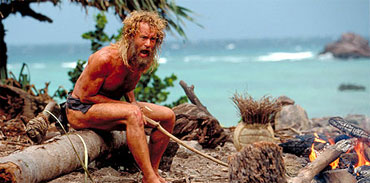Cast Away
 Melancholy! Eternal solitude! Tom Hanks and Robert "Forrest Gump" Zemeckis reunite for the year's most unlikely blockbuster. Melancholy! Eternal solitude! Tom Hanks and Robert "Forrest Gump" Zemeckis reunite for the year's most unlikely blockbuster.
- - - - - - - - - - - -
By Stephanie Zacharek
Dec. 22, 2000 | Melancholy will never be a trend in movies -- it's not the sort of thing that packs theaters. And how exactly do you market it? That may be why the trailers and pre-release hype for Robert Zemeckis' "Cast Away" made it look so frightfully inspirational and, frankly, dismissable: Tom Hanks gets marooned on a small tropical island, the sole survivor of a plane crash. Any sane person who has seen a movie in the past 10 years -- or at any point in his or her life -- would be justified in thinking it's probably an uplifting movie about triumph over adversity, the indomitable human spirit and other such nonsense.
But then, aside from the fact that we should all know better than to make judgments about movies based on trailers and ad campaigns, one of the great pleasures of moviegoing is being surprised. "Cast Away" is about triumph over adversity, but only in the roughest sense. Anyone who has seen the trailer knows that Hanks' character survives his desert-island stint and comes back to civilization. But there's no way to foresee what Hanks, an astonishingly gifted performer who in recent years has taken nothing but big-ticket, overblown prestige roles, has done with this part.
Hanks has scaled everything back -- every potentially overwrought expression or gesture, every bubble pocket of emotion that might normally be blown up large -- to forge a gossamer-tough bond of intimacy with his audience that few actors have the skill or subtlety to achieve. He works not in tides of feeling but in tide pools, and their stillness is devastating. "Cast Away" is a sad movie of the sort that Hollywood almost never makes: not three-hankie sad, not "go have yourself a good cry" sad, but the kind of thing that, if you let it in deep enough, can send a shudder to your very soul. It's mournful and troubling in a way that goes beyond ordinary movie manipulation. It burns clean.
"Cast Away" is a mainstream feature, conventionally made, and it offers few real artistic surprises outside of Hanks' performance. At its most predictable, "Cast Away" is exactly the movie you'd expect the post-"Forrest Gump" Robert Zemeckis to make (and a movie far, far removed from the delectable nastiness of his 1980 "Used Cars" or his 1992 "Death Becomes Her"). It comes off as potentially inspirational, possibly a little hokey, but infinitely well crafted and well acted.
"Cast Away" begins with so much formulaic portent that it took longer than usual for me to adjust to the movie I was watching rather than the one I expected to see. Hanks' character is Chuck Noland, a FedEx systems engineer who travels the globe to various FedEx offices, dispensing nuggets of bizspeak like "We live or die by the clock," a line that's obviously a setup for the long stretches of solitary time that Chuck will soon have to endure. Chuck enjoys being on the go, but he's less happy about being away from his girlfriend, Kelly (Helen Hunt). On Christmas Day he's forced to leave her to travel to the Far East on a last-minute assignment. The FedEx plane crashes en route, and he finds himself washed up on a remote island with little more than the clothes on his back -- and one shoe missing at that.
Hanks' Chuck doesn't make much of an impression in the movie's first half-hour. He's one of those bland, pudgy, time-is-money guys, nice enough, but not anyone you'd want to spend most of a two-hour-and-15-minute movie with, let alone end up on a desert island with. But after the crash sequence -- which is terrifying even for those who aren't normally afraid to fly, a roaring, crunching nightmare whose details are all too believable -- "Cast Away" takes a quietly shocking turn.
When Chuck washes up on the island, it's easy enough to envision a boy's adventure retooled for the early 21st century, in which a man reconnects with his most primitive survival instincts and plumbs depths of self-reliance he never knew he had. And that's certainly part of the movie's appeal. For a few days after the crash, half a dozen or so errant FedEx packages float up on the shore, and Chuck collects them and stashes them away, ostensibly for a time when he really needs them. When he finally opens them, after facing assorted challenges that include learning how to crack open coconuts, he's surrounded by a motley mess of apparently useless items: a pair of ice skates, a volleyball, a hideous tulle party dress, a package of videotapes. One of the movie's delights -- and "Cast Away" does have its delights -- is the way Chuck finds a use for everything; even the ugly party dress ends up as part of a fishing net.
Once "Cast Away" gets rolling, it drifts away from being a rousing survival tale and bobbles into less easily charted waters. Chuck's adventure is a lonely, desolate one, and that's constantly reaffirmed by cinematographer Don Burgess' massive ocean vistas and star-spattered skies. Zemeckis, screenwriter William Broyles Jr. and Hanks don't make Chuck's self-reckoning just one angle of the picture -- it's the very heart of it. |



